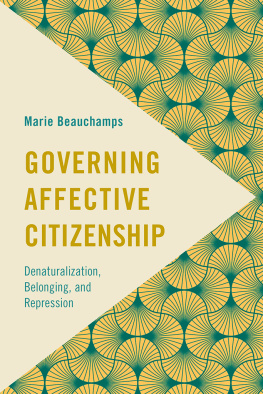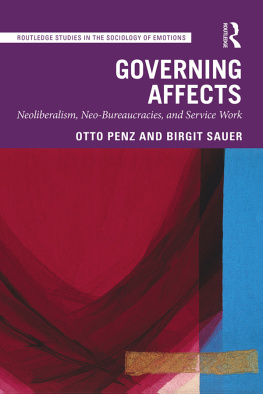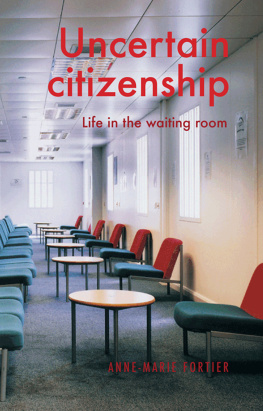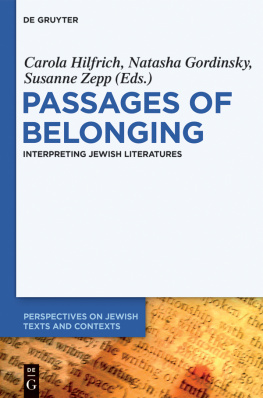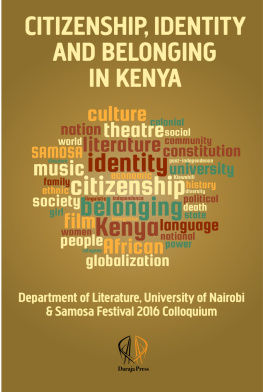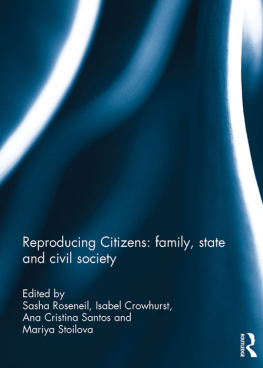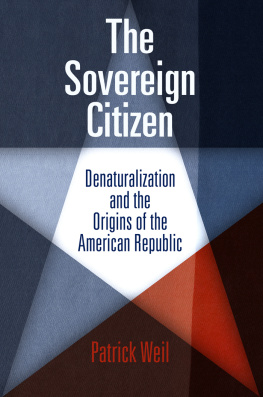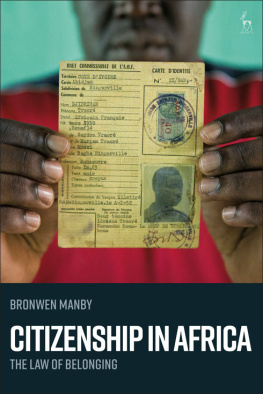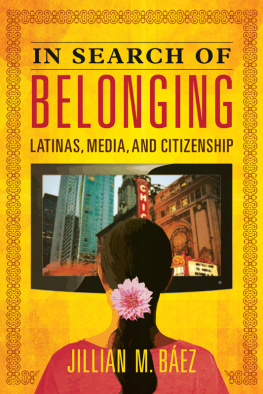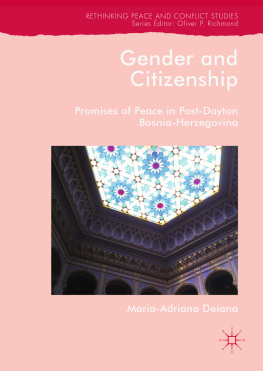i Governing Affective Citizenship
ii Frontiers of the Political
Series Editor:
Engin Isin is Professor of International Politics, Queen Mary University of London (QMUL) and University of London Institute in Paris (ULIP). He is a leading scholar of citizenship studies and is a Chief Editor of the journal Citizenship Studies. He is author and editor of eleven books in the field, including Being Political and Citizens Without Frontiers.
This series aims to contribute to our understanding of transversal political struggles beyond and across the borders of the nation-state, and its institutions and mechanisms, which have become influential and effective means of both contentious politics and political subjectivity. The series features titles that eschew and even disavow interpreting these transversal political struggles with categories and concepts.
Postcolonial Transitions in Europe: Contexts, Practices and Politics
Edited by Sandra Ponzanesi and Gianmaria Colpani
Citizenship and Place: Case Studies on the Borders of Citizenship
Edited by Cherstin M. Lyon and Allison F Goebel
The Question of Political Community: Sameness, Logos, Space
Jonna Pettersson
Postcolonial Intellectuals in Europe: Academics, Artists, Activists and their Publics, edited by Sandra Ponzanesi and Adriano Jos Habed
Citizen Journalism as Conceptual Practice: Postcolonial Archives and Embodied Political Acts of New Media
Bolette B. Blaagaard
Governing Affective Citizenship: Denaturalization, Belonging, and Repression
Marie Beauchamps
iii Governing Affective Citizenship
Denaturalization, Belonging, and Repression
Marie Beauchamps
iv Published by Rowman & Littlefield International Ltd
6 Tinworth Street, London SE11 5AL, United Kingdom
www.rowmaninternational.com
Rowman & Littlefield International Ltd.is an affiliate of Rowman & Littlefield
4501 Forbes Boulevard, Suite 200, Lanham, Maryland 20706, USA
With additional offices in Boulder, New York, Toronto (Canada), and Plymouth (UK)
www.rowman.com
Selection and editorial matter Marie Beauchamps, 2019
All rights reserved . No part of this book may be reproduced in any form or by any electronic or mechanical means, including information storage and retrieval systems, without written permission from the publisher, except by a reviewer who may quote passages in a review.
British Library Cataloguing in Publication Data
A catalogue record for this book is available from the British Library
ISBN: HB 978-1-7866-0677-8
Library of Congress Cataloging-in-Publication Data
Names: Beauchamps, Marie, 1984- author.
Title: Governing affective citizenship : denaturalization, belonging, and
repression / Marie Beauchamps.
Description: Lanham, Maryland : Rowman & Littlefield International, [2018] |
Series: Frontiers of the political | Includes bibliographical references
and index.
Identifiers: LCCN 2018040428 (print) | LCCN 2018050732 (ebook) | ISBN
9781786606785 (electronic) | ISBN 9781786606778 (cloth : alk. paper)
Subjects: LCSH: CitizenshipSocial aspectsFrance. | Citizenship, Loss
ofFrance. | National securitySocial aspectsFrance. |
RhetoricPolitical aspectsFrance. | National characteristics,
FrenchPolitical aspects.
Classification: LCC JN2919 (ebook) | LCC JN2919 .B43 2018 (print) | DDC
323.60944dc23
LC record available at https://lccn.loc.gov/2018040428

The paper used in this publication meets the minimum requirements of American National Standard for Information SciencesPermanence of Paper for Printed Library Materials, ANSI/NISO Z39.48-1992.
Printed in the United States of America
v Contents
PART III Terrorism, Nationality, and Citizenship:
France and Beyond
vi
vii Acknowledgments
This book began as my doctoral dissertation, which I defended in 2015, at the Amsterdam School for Cultural Analysis (ASCA), University of Amsterdam. Coincidentally, the year 2015 marked the hundredth anniversary of denaturalization law in France, turning the defense of my dissertation into an occasion to celebrate this historic moment within the sound of critique. I thank ASCA for giving me the gift of time and space to do uninterrupted research, during which I enjoyed Mireille Rosellos priceless supervision. I thank her most heartedly. Sincere thanks to my committee members: Louise Amoore, Robin Celikates, Marieke de Goede, Engin Isin, Christoph Lindner, and Sandra Ponzanesi.
Besides ASCAs vibrant research community, the project benefited from a close collaboration with a number of research networks, for which I am most grateful: the European Security Culture Project conducted by Marieke de Goede at the University of Amsterdam; the Literature and Law research group conducted by Frans-Willem Korsten and Yasco Horsman at Leiden University; the Oecumene Project conducted by Engin Isin at the Open University (UK); the Centre for Political Theory at the Universit Libre de Bruxelles, directed by Justine Lacroix; the 2013 European International Relations Summer School Security, Borders and Mobility jointly organized in Brussels (BE) by the University of Kents Brussels School of International Relations, Kings College London and Sciences Po Paris and led by Didier Bigo and Tugba Basaran; and the University of London Institute in Paris, then directed by Andrew Hussey. Furthermore, I conducted archival research in the French National Archives (Paris), in the French National Library (BNF, Paris), and in the Library of the French National Assembly (Paris). Special thanks to Eloe Kingma, Jantine van Gogh, Patricia Pisters, Tim Yaczo, Niall Martin, Hanneke Stuit, Mikki Stelder, Thijs van den Berg, Noa Roei, viii Sruti Bala, Johan Hartle, Astrid van Weyenberg, Pepita Hesselberth, Marijn Hoijtink, Gavin Sullivan, Stephanie Simon, Tessa de Zeeuw, Deena Dajani, Jef Huysmans, Teresa Pullano, Emmanuel-Pierre Guittet, Philippe Bonditti, Matthias Leese, Sharon Weinblum, Stef Wittendorp, Sarah Perret, Bruno Magalhes, Isabel Hollis, Sandra Mantu, Patricia de Vries, Bram Creusen, and Lucy Hall for your wonderful collegiality, openness, encouragements, and critical thoughts during all phases of this project. Your voices resonate as multiple echoes in my memory of its development, from its conception to its completion. So do the voices of all who made conferences and summer schools such inspiring and invigorating moments.
I most sincerely thank Dhara Snowden, my editor at Rowman & Littlefield International, and Engin Isin, my series editor, for making this happen. Many thanks to Rebecca Anastasi for her assistance throughout, and to Chloe Batch for the wonderful cover design.
Deepest thanks to Esther Peeren, Alexandra Gerny, Malu Peeters, and Lukas Hoex for reading parts of the manuscript when I was doing the final revisions, and to Engin Isin for reading the manuscript as a whole in its most final stage.
Last but not least, my gratitude goes to my friends and family, for having my back. Lukas, and Pablo, thank you for being there with me.
For reasons of legibility, I have provided only the English translations of French quotations from primary material and scholarly sources. Unless otherwise indicated, all translations are mine. In order to retain the poetic voice of epigraphs, however, Ive chosen to keep those citations untranslated.

 The paper used in this publication meets the minimum requirements of American National Standard for Information SciencesPermanence of Paper for Printed Library Materials, ANSI/NISO Z39.48-1992.
The paper used in this publication meets the minimum requirements of American National Standard for Information SciencesPermanence of Paper for Printed Library Materials, ANSI/NISO Z39.48-1992.
